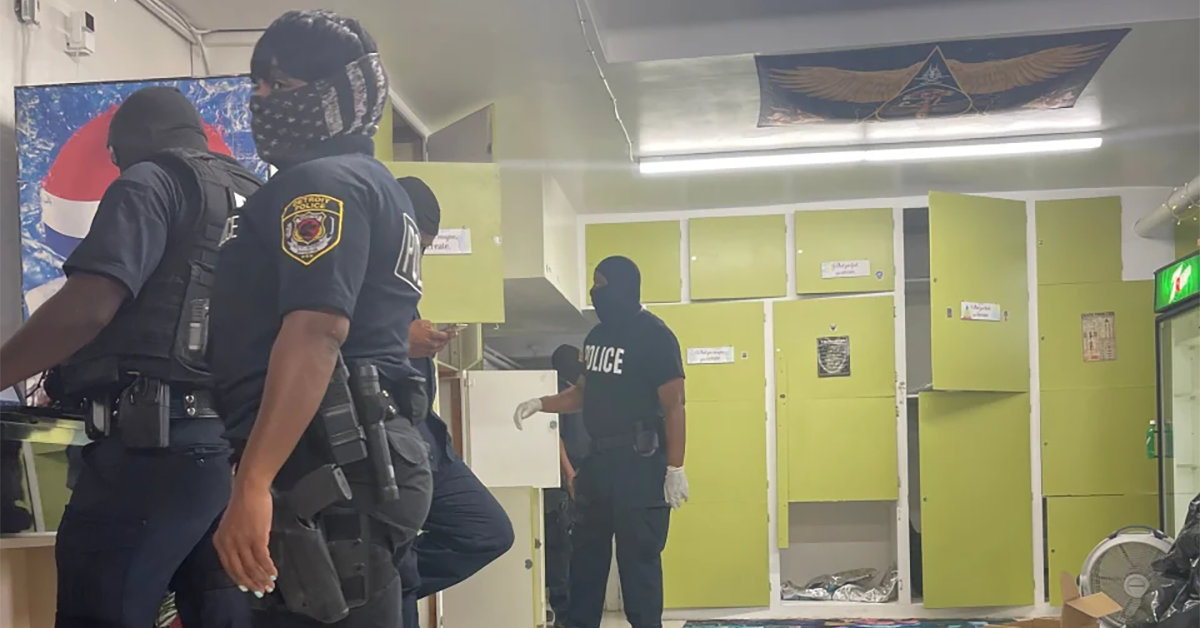Michigan Marijuana Farm Wins Tax Classification Battle

In Michigan, sprawling cannabis fields are indistinguishable from traditional farms, with plants reaching skyward from fertile ground and laborers busy during the autumn harvest. Advances in agricultural technology, like specialized grow lights and regulated temperatures, have made it possible for cannabis to flourish indoors as well.
Yet, there's a difference that Michigan's taxation department has held onto: marijuana isn't classified as agriculture when it comes to taxes. However, this perspective is being challenged.
A recent court decision, stemming from a 16-month legal tussle, permitted a southwest Michigan cannabis grower to enjoy farm tax exemption privileges. This groundbreaking move, the first for Michigan, was orchestrated by Detroit attorney Carl Rashid Jr. of Dykema Law, who represented HRP Cassopolis LLC, an indoor cannabis cultivator associated with several brands and a dispensary in Cassopolis.
The contention started when HRP Cassopolis, which possesses four Class C licenses allowing for up to 2,000 stackable plants, was told their farm was commercial property for tax purposes. Their efforts to change this classification via the March Board of Review and the Michigan State Tax Commission were unsuccessful.
HRP Cassopolis's argument was clear: given the Michigan Department of Agriculture and Rural Development's classification of cannabis as an "agricultural commodity," why was their property deemed commercial? Yet, the state remained steadfast, insisting cannabis cultivation wasn't agricultural.
Their perseverance led to an appeal in the 43rd District Court of Cass County, where the state tax commission's broad definition of agriculture was highlighted. Ultimately, Cass County Circuit Court Judge Carol Montavon Bealor confirmed cannabis cultivation's place within the agricultural sphere.
While this win signals potential tax benefits for other marijuana growers, it also opens conversations on how cannabis integrates into Michigan's massive $104 billion agricultural industry. Will Bowden, CEO of Grasshopper Farms, emphasized the need for recognition of outdoor cannabis cultivation as pure farming.
The majority of cannabis cultivation occurs indoors, yet farms like Grasshopper Farms in Paw Paw, with over 6,000 plants spread across 32 acres, and Lume, set to harvest 40,000 plants on a 70-acre plot, underscore the growing trend of outdoor cultivation, marrying traditional farming methods with modern crops.
Despite the ruling, cannabis growers must navigate the appeals process for tax reclassification, as the court's decision isn't nationally binding. Only rulings from higher Michigan courts would cement the status quo. As Mark Magyar from Dykema Law notes, cannabis cultivators now stand on the precipice of a defining moment, with this opinion offering a compelling argument.
Twin Break-Ins at Marijuana Dispensaries Prompt Investigation in Jackson County

In a concerning pre-dawn string of events on October 1st, two marijuana dispensaries in Jackson County were targeted in what police believe to be coordinated burglaries by an identical group of assailants.
The initial incident transpired at Smart Choice, situated on Falahee Road in Leoni Township. The Blackman-Leoni Township Department of Public Safety revealed that officers were summoned to the scene at approximately 3 a.m. following the activation of a burglar alarm.
Upon arrival, law enforcement discovered forced entry through the store's door, noting that multiple suspects had infiltrated the dispensary, making away with 45 marijuana plants before vanishing from the vicinity.
Security footage from the incident captured images of five individuals, shrouded in masks, forcibly entering the store. The perpetrators were witnessed absconding with the stolen plants, utilizing a white Dodge Durango as their escape vehicle.
A mere four hours following this incident, at approximately 6:52 a.m., officers responded to a second break-in, this time occurring at Kinship Cannabis, located on N. Concord Road in Parma Township.
In a startlingly similar modus operandi, surveillance video from Kinship Cannabis disclosed six masked individuals pilfering an undetermined quantity of plants, once again making their departure in a white Dodge Durango.
The Jackson County Sheriff's Office, citing the striking resemblances in the two incidents, posits that both illicit entries were executed by the same cohort of suspects.
As of now, no apprehensions have been made. Investigations into these synchronized thefts continue, with law enforcement seeking any leads or information that could aid in the capture and prosecution of the perpetrators.
[Updated] Wimberly's Legal Fog Amidst Michigan Cannabis Scandals

Correction and Update: The initial article contained speculative content regarding the nature of the charges against Inkster Mayor Patrick Wimberly, suggesting they might be related to marijuana industry corruption due to existing patterns in Michigan. However, subsequent developments have provided clarity, revealing that the charges against Mayor Wimberly are unrelated to the cannabis industry. The mayor has been indicted on a federal bribery charge, alleged to have demanded and accepted bribes to facilitate the sale of city property. We apologize for any confusion or misrepresentation the initial piece might have caused and are committed to providing accurate and verified information.
In recent months, Michigan has witnessed a series of high-profile cannabis-related corruption cases, causing a ripple of concern through the burgeoning marijuana industry and its regulatory apparatus. The spotlight is now shone on Inkster Mayor Patrick Wimberly, as federal prosecutors prepare to charge him with a felony following a public corruption investigation. Though specifics of the case remain under the veil of sealed court documents, the history of cannabis-related malfeasance in the state prompts speculation about potential parallels.
One notable case that has reverberated through Michigan's political and business circles involved former Michigan House Speaker Rick Johnson. Johnson, who was deeply entrenched in the regulatory frameworks governing the state's nascent medical marijuana industry, was sentenced to 55 months in federal prison for accepting bribes exceeding $110,200, a scenario further complicated by the involvement of lobbyists' funded liaisons during his leadership of the medical marijuana licensing board.
Additionally, the sentencing of Detroit businessman John Dalaly to 28 months in prison for bribing the former head of Michigan's marijuana licensing board and the conviction of Ryan Richmond, a Michigan dispensary owner, for tax evasion and obstruction of the IRS, underlines an unsettling pattern of corruption and financial malfeasance within the state's cannabis industry.
With this backdrop, the sealed court order related to Mayor Wimberly, though offering no explicit insights, does spark conjecture. Wimberly, apart from his political career, is identified as a marijuana entrepreneur, tying him directly to an industry that has recently seen several of its players implicated in bribery, tax evasion, and other corrupt practices.
It is crucial to underscore that the insinuations drawn between Wimberly's impending charge and the aforementioned cases are speculative and unconfirmed. Legal proceedings are bound by principles of presumption of innocence until proven guilty, and as such, any assertions regarding Wimberly's case remain hypothetical until detailed charges are unveiled.
Yet, the pattern observed in recent cases, especially concerning individuals who straddle the lines between cannabis entrepreneurship and regulatory roles, raises pertinent questions about the mechanisms in place to safeguard against corruption in this rapidly expanding industry.
As Michigan's cannabis industry continues to burgeon, ensuring robust, transparent, and corruption-free regulatory and business environments is paramount. Learning from the cases of Johnson and others, establishing clear boundaries between business interests and regulatory oversight, alongside stringent financial transparency requirements, may serve as pivotal steps in mitigating potential conflicts of interest and corruption.
The upcoming weeks will likely shed more light on the specifics of the case against Mayor Wimberly. As we await further details, the conversation about ensuring the ethical and transparent development of Michigan's cannabis industry remains ever crucial and timely.
Detroit Police Raid Puts Psychedelic Decriminalization to the Test

Note to Readers: While the primary focus of our platform remains cannabis-related news, we think it's important to explore the parallel happenings in the realm of psychedelic substances in Michigan, due to its close kinship and its potential implications for future policy-making in related fields. We hope you find the following article enlightening.
In a pivotal moment in 2021, Detroit saw a marked shift toward leniency in drug policy with the voter decision to decriminalize psychedelic mushrooms and several related substances. However, the practical application of this seemingly progressive move has recently been challenged.
Last week, Soul Tribes International Ministries, a self-identified psychedelic religious institution, faced a raid by Detroit police. Despite the organization's assertions of legal and religious sanctity in their practices, the authorities conducted a search, seized substances, and subsequently shut down the operation, branding it illicit.
Shaman Bobby Shu, the founder of Soul Tribes, has expressed a firm intent to resume operations by Monday. The point of contention arises from Proposal E, which was affirmed by 61% of Detroit voters in 2021. While it intended to decriminalize psychedelics within city boundaries, Assistant Corporation Counsel Doug Baker highlights that it neither specifically sanctions the sale/distribution of psilocybin mushrooms nor supersedes state law that continues to designate psilocybin as a controlled substance.
The enforcement of the said operation, according to a police statement, ensured the confiscation of "illegal controlled substances" and cessation of an "illegal operation" that purportedly posed a risk to the community.
Soul Tribes, having inaugurated its services inside the longstanding Bushnell Congregational Church over Labor Day weekend, offers access to psilocybin mushrooms, ayahuasca, and other entheogenic plants they deem sacraments. The ministry eloquently defends its position: "These sacraments reflect our deeply-held religious beliefs and form an integral part of our worship and religious practices, as supported by the Religious Freedom Restoration Act of 1993."
The founder, Shu, was not only pivotal in the institution's operations but was also actively involved in the campaign to pass Proposal E. The resulting city ordinance from the proposal indeed states that law enforcement pertaining to "the personal possession and therapeutic use of entheogenic plants by adults" should be of the lowest priority in Detroit.
In a nuanced explanation, the ordinance clarifies therapeutic use as involving a range of activities with entheogenic plants among adults, potentially under the guidance of a licensed therapist, medical professional, or religious leader. It endeavors to:
- Decriminalize personal possession and therapeutic use of entheogenic plants for adults to the maximum extent permissible under Michigan and federal law.
- Deprioritize the imposition of penalties for related offenses within Detroit.
- Avoid impeding the enforcement of pertinent state or federal laws.
Even before the abrupt shutdown, Shu conveyed that he had engaged in dialogues and email communications with the Detroit Police Department (DPD), affirming the legitimacy of Soul Tribes as a legal and religious entity, registered with the state.
Shu reveals that the police confiscated entheogenic plants valued at over $700,000 and emphasizes that he has not been criminally charged related to the raid. He, along with his legal team, is diligently working to reopen the facility.
Beyond providing access to entheogenic plants and guiding participants through sessions, Soul Tribes also offers teachings on breath work, thought management, reiki, and meditation, among other practices.
Asserting his rights, Shu stated, "You cannot discriminate against us because of our religious beliefs, that's the First Amendment. The police's job is to enforce city ordinances."
This instance underscores the complexity and potential friction points in the navigation between local ordinances, state law, religious freedoms, and drug policy reform—a topic surely to continue sparking debates and discussions in Michigan and beyond.
Stay tuned to our platform for more updates on policy changes, debates, and discussions related to cannabis and psychedelics in Michigan.
Sebewaing Woman Admits to Breaking into Neighbor's Home to Steal Marijuana

In a recent twist in Michigan's legal landscape concerning marijuana, a 41-year-old resident of Sebewaing, Jessica Saenz, has confessed to unlawfully entering a neighbor's home multiple times with the intent to steal marijuana. This revelation came to light during a session in Huron County's 52nd Circuit Court on Monday.
Saenz's admission comes after being accused of the third-degree home invasion during her neighbor's vacation period between November 29th and December 3rd, 2022. In a detailed confession, she verified that she intruded the property without consent, capitalizing on the homeowner's absence.
The gravity of Saenz's act is further intensified as third-degree home invasion is classified as a felony in Michigan, carrying with it the potential consequences of up to five years in prison and fines that can reach up to $2,000.
Judge Gerald M. Prill, who oversaw the arraignment, has now accepted a plea agreement in which Saenz will pay full restitution. This decision comes with an assurance from the prosecution not to introduce or amend any further charges pertaining to this case.
Saenz currently remains out of custody, having posted a $5,000 cash or surety bond. Her scheduled sentencing will take place on Monday, November 27th at 9 a.m.
This case highlights the complexities surrounding marijuana and its place within the community, even in states like Michigan where its use has been legalized. As the story unfolds, residents and stakeholders will undoubtedly watch closely, bearing witness to the unfolding ramifications of this case on the broader marijuana discourse in Michigan.
55 Months in Prison: The Price Rick Johnson Pays for Bribery

In a landmark bribery case, former Michigan House Speaker Rick Johnson was handed a 55-month federal prison sentence on Thursday. Johnson, 70, from LeRoy, Michigan, faced charges for accepting bribes totaling over $110,200, including liaisons funded by lobbyists, during his tenure as chairman of Michigan's emerging medical marijuana licensing board.
The bribes, facilitated by Detroit businessman John Dawood Dalaly and Lansing lobbyists Vincent Brown and Brian Pierce, were in exchange for Johnson's aid in expediting their business applications, divulging confidential board deliberations, and influencing approvals. He accepted cash payments, a "loan", services from an adult entertainment worker, and private jet trips to confer with Canadian investors.
The legal proceedings have raised questions about the fairness and transparency of the state's marijuana licensing process. U.S. District Judge Jane Beckering, overseeing the case in Grand Rapids, recently sentenced Dalaly to a 28-month prison term. While Johnson and his accomplices pleaded guilty in April, with hints of further indictments, no additional charges have surfaced.
Prosecutors highlighted the case's significance, noting, "Johnson's crime has severely undermined trust in his role as MMLB Chair and in state governance."
Johnson's attorney, Nicholas Dondzila, advocated for a lighter sentence, highlighting Johnson's cooperation with the investigation, his public service, and clean prior record.
Johnson's political stint began in 1971 as the Rose Lake Township treasurer, advancing to a five-year term in the state House and culminating as the House Speaker from 2001-2004. His subsequent role in a lobbying firm and controversial appointment to the marijuana board by then-Gov. Rick Snyder, given his prior ties to the industry, drew public scrutiny.
The remaining lobbyists, Pierce and Brown, await their sentencing on October 18th.


 Helpful Links
Helpful Links